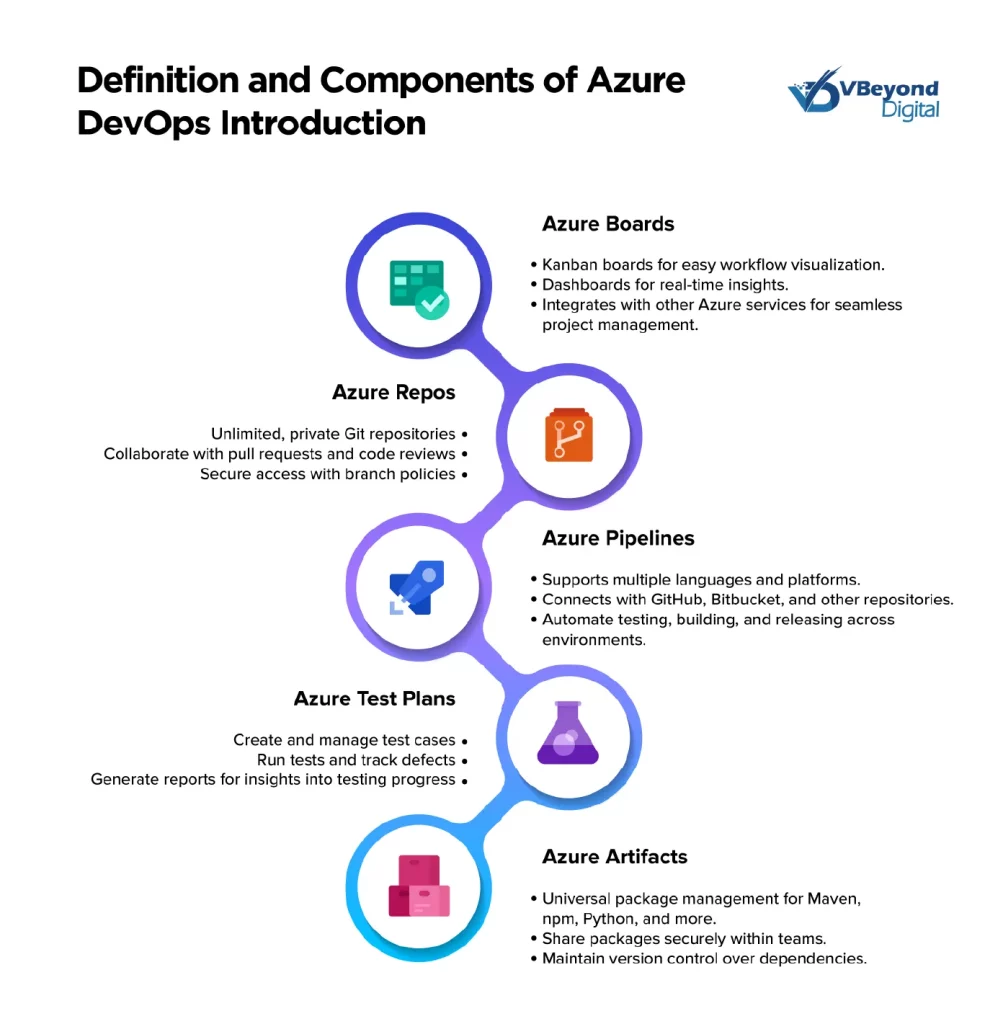Section
Table of Contents
- Azure DevOps: A Strategic Asset for Agile Project Management
- Significance of Azure DevOps in Software Development Lifecycle
- Role of Continuous Integration and Continuous Deployment (CI/CD) in Project Delivery
- Azure DevOps Integration Tools and Services
- Strategic Implementation of Azure DevOps for Senior Executives
- Best Practices for Maximizing Efficiency with Azure DevOps
- DevOps Future Trends with Azure Integration
- Conclusion
Section
In today’s fast-paced software development environment, managing projects efficiently is crucial for delivering customer-centric applications. “Simplifying Project Management with Azure DevOps: The Key to Building Truly Customer-Centric Applications” explores how Azure DevOps serves as an integral tool in this process. The blog delves into the various features of Azure DevOps, such as agile planning, version control, code sharing, and automated builds, demonstrating how these capabilities can help project teams streamline their workflows. By integrating all phases of the development lifecycle, Azure DevOps ensures that teams can focus on innovation and meet customer needs effectively, making project management more effective and responsive.
Adopting DevOps offers transformative potential, especially for businesses with customer facing applications such as banking and financial services, fintech, gaming and entertainment, and more. Institutions that have embraced DevOps report enhanced ability to address software delivery barriers, such as regulatory compliance and security concerns, which traditionally slowed innovation. Most notably, financial enterprises have achieved faster deployment times, higher operational efficiency, and improved product quality by streamlining project management with Azure DevOps, propelling them towards better competitiveness and customer satisfaction.
Azure DevOps: A Strategic Asset for Agile Project Management
The adoption of DevOps practices within financial services has grown significantly, driven by the need to enhance operational efficiencies and improve continuous delivery capabilities. Financial institutions are increasingly turning to Azure DevOps to streamline their project delivery processes.
According to industry insights, over 80% of financial organizations have adopted DevOps methodologies to some extent, reflecting a widespread recognition of their benefits in terms of reduced time to market and enhanced collaboration across development and operations teams.
Azure DevOps as a Solution
Azure DevOps provides an integrated set of features that streamline collaboration across project management, software development, and quality assurance. It enhances project delivery through automation, improved workflows, and continuous feedback, allowing banks, intermediaries, and payment service providers (PSPs) to accelerate their project timelines while maintaining high standards of quality and compliance.
Azure DevOps makes application development project management easier, especially within environments demanding high agility and robust governance such as finance and banking sectors. With Azure DevOps, organizations gain a potent suite designed to streamline and enhance various stages of project delivery.
Definition and Components of Azure DevOps Introduction
Azure DevOps is an extensive collaboration platform from Microsoft, tailored for software development projects that require rigorous project management practices. It comprises several key components:
- Azure Boards: A tool for project planning and bug tracking, offering Kanban boards, dashboards, and integrations with other services.
- Azure Repos: Provides Git repositories for source control of your code.
- Azure Pipelines: Enables continuous integration (CI) and continuous deployment (CD) for a smooth and automated workflow.
- Azure Test Plans: Offers a suite of tools for testing software, including manual and exploratory testing options.
- Azure Artifacts: Manages dependencies and package sharing across teams.
Section
Section
Streamline Project Success with Azure DevOps
Section
Significance of Azure DevOps in Software Development Lifecycle
The integration of Azure DevOps into the software development lifecycle (SDLC) empowers teams to implement DevOps implementation practices effectively. It not only supports planning and tracking but also handles the CI/CD pipeline setup for deploying applications reliably and consistently.
By embedding CI/CD in Azure DevOps and maintaining tight integration with Azure’s cloud services, teams can automate workflows to reduce manual errors and decrease the overhead on IT staff. The result is a significant boost in project throughput and a marked reduction in go-to-market times, which is crucial for financial institutions dealing with rapidly changing technologies and regulatory environments.
This blend of integrated services within Azure DevOps ensures that from Azure DevOps introduction to final deployment, all processes are aligned with industry best practices for project management with Azure DevOps.
Role of Continuous Integration and Continuous Deployment (CI/CD) in Project Delivery
Implementing CI/CD is a cornerstone of modern software development, particularly in complex project environments like those found in financial services. Azure DevOps provides a robust framework for executing these practices effectively.
Explanation of CI/CD and Its Importance
Continuous Integration (CI) involves the practice of automating the integration of code changes from multiple contributors into a single software project. Continuous Deployment (CD) extends CI by automatically deploying all code changes to a testing or production environment after the build stage. The incorporation of Azure DevOps CI/CD pipeline in project management is pivotal for ensuring that integration and deployment processes are seamless, consistent, and error-free.
Why Go with Azure DevOps to Streamline CI/CD?
Azure DevOps enhances CI/CD in Azure DevOps by providing tools that automate steps which traditionally required manual oversight, thus reducing the scope for human error, and speeding up processes. Here are specific ways Azure DevOps optimizes CI/CD:
- Automated Builds and Testing: Azure Pipelines automates the build and test phase, which helps to catch bugs early and reduces integration problems. Using Azure DevOps for Azure DevOps continuous integration ensures that code commits are continually built and tested, leading to higher code quality and reliability.
- Continuous Delivery Capabilities: With Azure Pipelines, the Azure DevOps continuous deployment process becomes more manageable and less risky. Pipelines can automatically deploy the code to various environments based on predefined criteria and approval workflows, which is crucial for maintaining the stability of applications in production.
The role of Azure DevOps in managing DevOps implementation extends beyond mere automation. It fosters a culture of continuous improvement, vital for dynamic sectors like banking and finance where regulatory and market conditions evolve quickly. This capacity to adapt and respond swiftly to changes is what sets project management with Azure DevOps apart in today’s digital economy.
Section
Azure DevOps Integration Tools and Services
Azure DevOps excels in its ability to integrate seamlessly with numerous tools and services, enhancing project delivery through streamlined workflows and improved collaboration.
Azure DevOps integration tools enhance its utility and flexibility, making it a powerful hub for Azure DevOps project management. These tools include:
- GitHub: Integrating Azure Repos with GitHub allows for smooth code sharing and collaboration across platforms, facilitating a unified approach to source control management.
- Slack: By integrating with communication platforms like Slack, Azure DevOps can send real-time notifications about builds, deployments, and more, ensuring that all team members stay informed.
How Integration with External Tools Improves Workflow Efficiency
The integration capabilities of Azure DevOps extend beyond basic functionality, enabling teams to automate workflows and connect various phases of the software development lifecycle. For example:
- Automated Alerts and Notifications: Tools like Slack and Microsoft Teams can be configured to receive automatic updates from Azure DevOps, keeping the team aligned and quickly responsive to any changes or issues.
- Enhanced Collaboration: Integrating with collaboration tools helps in bridging the gap between developers and non-developers within the project team, fostering a more inclusive and productive environment.
These integrations not only simplify project management with Azure DevOps but also amplify its effectiveness, driving better project outcomes through enhanced collaboration and automation. The ability to connect with various external tools and services ensures that Azure DevOps remains adaptable to any project’s needs, embodying the essence of DevOps implementation.
Measurable and Tangible Benefits Observed
The adoption of Azure DevOps by these financial institutions led to several measurable improvements:
- Reduced Deployment Times: Streamlined workflows and automated processes cut down deployment times, enhancing agility in product updates and patches.
- Improved Code Quality: Continuous integration and testing frameworks helped maintain high standards of code quality, significantly reducing post-deployment issues and downtime.
These case studies demonstrate the strategic value of DevOps implementation in environments where precision and reliability are paramount. The project management with Azure DevOps framework provides a robust foundation for continuous improvement and operational excellence in the demanding financial services sector.
Strategic Implementation of Azure DevOps for Senior Executives
For senior executives, the strategic implementation of Azure DevOps is crucial to harness its full potential for enhancing project delivery. This section outlines the steps and considerations necessary for successful deployment at an organizational level.
Steps to Implement Azure DevOps at an Organizational Level
Implementing Azure DevOps across an organization requires careful planning and execution:
- Assessment of Current IT Infrastructure: Executives must evaluate their current systems and processes to understand how Azure DevOps can be integrated effectively.
- Strategic Planning: Define clear objectives and outcomes expected from implementing Azure DevOps CI/CD pipeline and other features.
- Resource Allocation: Ensure adequate resources are dedicated to the deployment and ongoing management of Azure DevOps tools.
Key Considerations for CTOs, CEOs, and Other Executives
When adopting Azure DevOps, senior leaders should focus on several critical areas:
- Training and Development: Providing training for staff to understand and utilize Azure DevOps effectively is essential for adoption.
- Cultural Shifts: Embracing a culture of continuous integration and deployment is fundamental. This may require changes in mindset and operations from the top down.
- Continuous Improvement: Azure DevOps is not a set-it-and-forget-it solution. Regular reviews and adaptations are necessary to optimize its use and value.
Addressing Challenges
Implementing Azure DevOps involves overcoming various challenges, such as:
- Integration Complexity: Seamlessly integrating Azure DevOps with existing tools and systems can be complex and requires a thoughtful approach.
- Change Management: Managing the change across all levels of the organization is critical to avoid disruption and resistance.
The role of Azure DevOps project management in this context is to provide a framework that supports not only technical requirements but also organizational dynamics, ensuring that the benefits of DevOps implementation are realized fully and efficiently.
Section
Best Practices for Maximizing Efficiency with Azure DevOps
To maximize the advantage from Azure DevOps, organizations must adopt best practices that promote efficiency and effectiveness in managing projects. These practices are crucial for sustaining long-term benefits and optimizing the use of Azure DevOps in project delivery.
Practical Tips for Adopting Azure DevOps for Optimal Results
- Continuous Monitoring and Feedback: Implement monitoring tools within Azure DevOps to track performance and gather feedback. This data is crucial for ongoing improvement and helps identify bottlenecks in the CI/CD process.
- Regular Updates and Training: Azure DevOps is continually evolving, so keeping your team updated with the latest features and providing regular training sessions will ensure that everyone is maximizing the platform’s capabilities.
- Customization to Fit Organizational Needs: Customize Azure DevOps to align with your organizational workflows. Utilizing Azure Boards effectively for project tracking or tailoring Azure Pipelines for your specific CI/CD needs can significantly enhance productivity.
Importance of Monitoring and Optimizing the DevOps Processes Continuously
To maintain efficiency, it is vital to continuously review and refine your DevOps processes. This involves:
- Iterative Improvement: Apply an agile approach not just in development but also in process management. Regularly review the CI/CD in Azure DevOps setups and adjust as needed to improve speed and reduce errors.
- Feedback Loops: Establish strong feedback loops using Azure DevOps reporting tools to ensure that insights gained from one project cycle inform the next, fostering a culture of continuous improvement.
By implementing these best practices, organizations can ensure that their DevOps implementation with Azure DevOps is not just a one-time setup but a dynamic, integral part of their IT operations that grows and improves over time, continuously adding value to the project management processes.
DevOps Future Trends with Azure Integration
As technology evolves, so too does the landscape of DevOps. Staying ahead of trends is crucial for organizations using Azure DevOps to ensure they continue to maximize efficiency and drive innovation.
Emerging Trends and Azure DevOps Future Enhancements
- Increased Use of AI and Machine Learning: Azure DevOps Future enhancements are likely to integrate more AI and machine learning capabilities to automate more complex tasks within the DevOps lifecycle, from predictive analytics for bug fixing to AI-driven code reviews.
- Expansion of DevSecOps: Security will become more integrated within the DevOps process, enhancing Azure DevOps continuous deployment strategies to include more robust security measures, effectively shifting towards a more comprehensive DevSecOps approach.
- Enhanced Integration with Hybrid and Multi-cloud Environments: As organizations adopt hybrid and multi-cloud strategies, Azure DevOps will enhance its integration capabilities, allowing for seamless workflows across different cloud environments, emphasizing the flexibility of DevOps implementation.
Predictions on How Azure DevOps Will Continue to Evolve
- Serverless DevOps: The rise of serverless computing will influence Azure DevOps to support serverless application development, thereby reducing the complexity of scaling and managing infrastructure.
- Blockchain in DevOps: With the growing relevance of blockchain technology, Azure DevOps might incorporate blockchain to enhance transparency and traceability in software development and deployment processes.
These anticipated developments promise to enhance the strategic value of Azure DevOps project management, ensuring that it remains at the forefront of technological innovation and continues to offer significant benefits in project delivery efficiency.
Section
Conclusion
Reflecting on the integration and utilization of Azure DevOps, it’s clear that its strategic value extends well beyond basic project management. It embodies a transformative approach to software development, continuous integration, and delivery, offering significant advantages for financial institutions and other complex organizational structures.
Azure DevOps is not merely a tool but a highly effective approach to enterprise digital transformation as well as customer-facing applications. For organizations aiming to elevate their project delivery frameworks and stay competitive in an ever-evolving technological landscape, adopting Azure DevOps can lead to remarkable improvements in software development efficiency, effectiveness, and overall project success.





